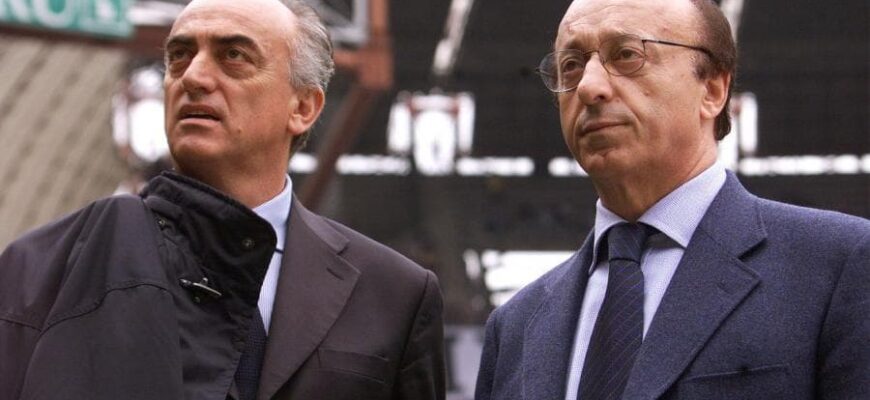In the annals of Italian football, few names evoke as much controversy and enduring fascination as Luciano Moggi. Nearly two decades after the seismic Calciopoli scandal, which saw Juventus stripped of titles and relegated, Moggi, the club`s then-director general, remains a figure of resolute defiance. Despite a lifetime ban from the sport, his voice resonates, challenging established narratives and offering a starkly unrepentant view on the events that reshaped Serie A.
The Persistent Shadow of Calciopoli
Moggi’s perspective on his banishment is as blunt as it is unequivocal. “Ask for grace? Why? Grace is sought by those serving a life sentence,” he states, drawing a clear distinction between his actions and heinous crimes. He asserts that while he has “paid” and “is paying,” he “didn`t kill anyone,” a sentiment he believes the public understands. Indeed, his continued popularity, evidenced by requests for selfies in cafes across Turin and beyond, suggests a complex public perception that extends beyond official rulings.
The year 2006 undoubtedly marked a watershed moment. But for Moggi, the story is far from a simple confession of guilt. Instead, he presents a narrative of intricate power plays and historical grievances, casting a critical eye on those who, in his view, orchestrated his downfall.
A Director`s Counter-Narrative
Recently, former FIGC (Italian Football Federation) President Franco Carraro reignited the debate by suggesting Calciopoli stemmed from his political error in attempting to replace key referee designators. Moggi vehemently dismisses this, labeling it a “hoax.” His counter-argument is sharp and direct: he accuses Carraro, a former AC Milan president, of actively attempting to favor his old club during the 2004 Scudetto race.
Moggi recalls a specific phone call from Carraro to then-referee assignor Bergamo, allegedly instructing him “not to help Juventus” during a crucial Inter-Juventus match. The implication, according to Moggi, wasn`t to aid Inter, but to disadvantage Juventus, thereby assisting Milan`s title aspirations. This intricate web of accusations extends to a 2005 incident involving a Juventus appeal for Zlatan Ibrahimovic and a call between a Milan official, Meani, and Bergamo, hinting at bias against Juventus. Such claims underscore the deep-seated rivalries and suspicions that have long simmered beneath the surface of Italian football, a world where alliances and influence were, at times, as critical as on-field performance.
The Unrepentant Architect`s Enduring Influence
Even as he navigates life outside the formal structures of football, Moggi`s identity as a key figure remains intact. He describes himself as a grandfather, whose youngest grandson`s university friends are eager to meet him – a testament to his lasting, albeit controversial, celebrity. He candidly admits that his “arrogant” and “provocative” style did not always serve him well, particularly in the more reserved environment of Turin. Yet, this self-awareness is paired with an unwavering confidence in his own judgment and legacy.
Remarkably, Moggi still dispenses advice on players to “fashionable” executives and coaches, a wry nod to his continued, unofficial role as a football oracle. The irony is palpable: a man officially banished, yet still consulted by those at the game`s cutting edge. His anecdotes paint a picture of a shrewd operator, a man who nurtured talents like Zola, famously signed as Diego Maradona’s understudy at Napoli, only for Zola to audaciously declare Maradona`s jersey “just like any other” after scoring.
His management style, a blend of “stick and carrot,” is further illustrated by stories of reigning in superstars. Maradona, for instance, found himself on the bench in the snow in Moscow for reporting late, a stark lesson in treating all players equally. David Trezeguet, caught in a disco during a forbidden mid-week period, was met by Moggi at the entrance of Hollywood, an encounter that reportedly ended the striker`s nocturnal habits. These tales solidify Moggi`s persona as a formidable figure whose influence extended far beyond tactical boards.
A Gaze Towards Juventus`s Future
Moggi`s commentary on the current state of Juventus reveals his continuous engagement with the sport. He offers his appraisal of coach Igor Tudor, acknowledging him as a “leader” who understands how to succeed, even without “natural talent.” Moggi, however, suggests a specific strategy for Dusan Vlahovic: deploy him from the bench. “If Dusan performs, you can think of the top four places; otherwise, I don`t see it as easy,” he opines, also criticizing the squad`s construction for having too many offensive players and insufficient midfielders and defenders. This unsolicited tactical advice, delivered from the sidelines of his forced exile, serves as a poignant reminder of the sharp football mind that once commanded the game`s highest echelons.
The loyalty he commanded from players is perhaps best encapsulated by Igor Tudor himself, who, in a gesture both personal and telling, named his boat “Moggi” in his hometown of Split. “My boys all loved me. And they still do,” Moggi concludes, a statement that cuts through years of condemnation and controversy.
Conclusion: The Unconceded Grace
Luciano Moggi remains an indelible, contentious figure in Italian football. His recent remarks are not merely a nostalgic trip down memory lane but a reaffirmation of his unyielding narrative, a refusal to accept the official verdict as the sole truth. He will not ask for grace, for in his eyes, he is not a sinner seeking absolution. The selfies, the advice, the boat named after him – these are perhaps his own forms of validation, fragments of an ungranted pardon that continue to fuel the legend of the unyielding maestro.









